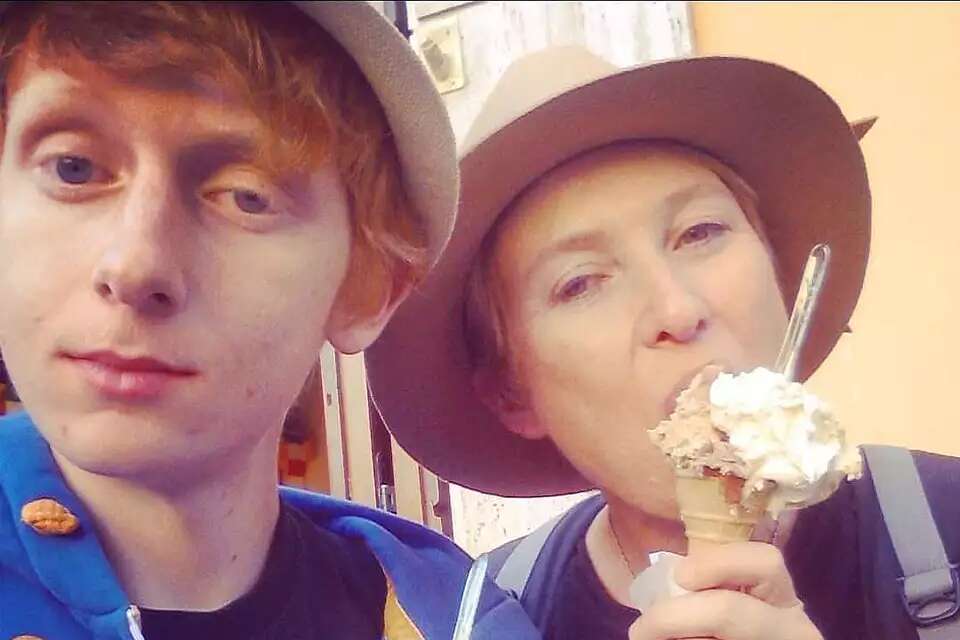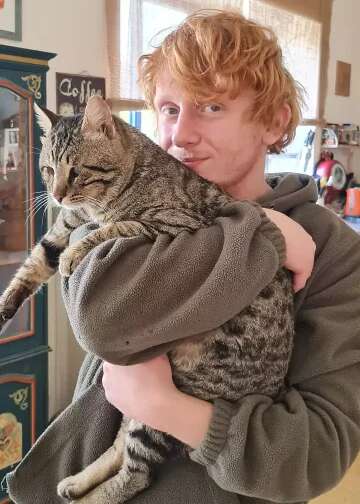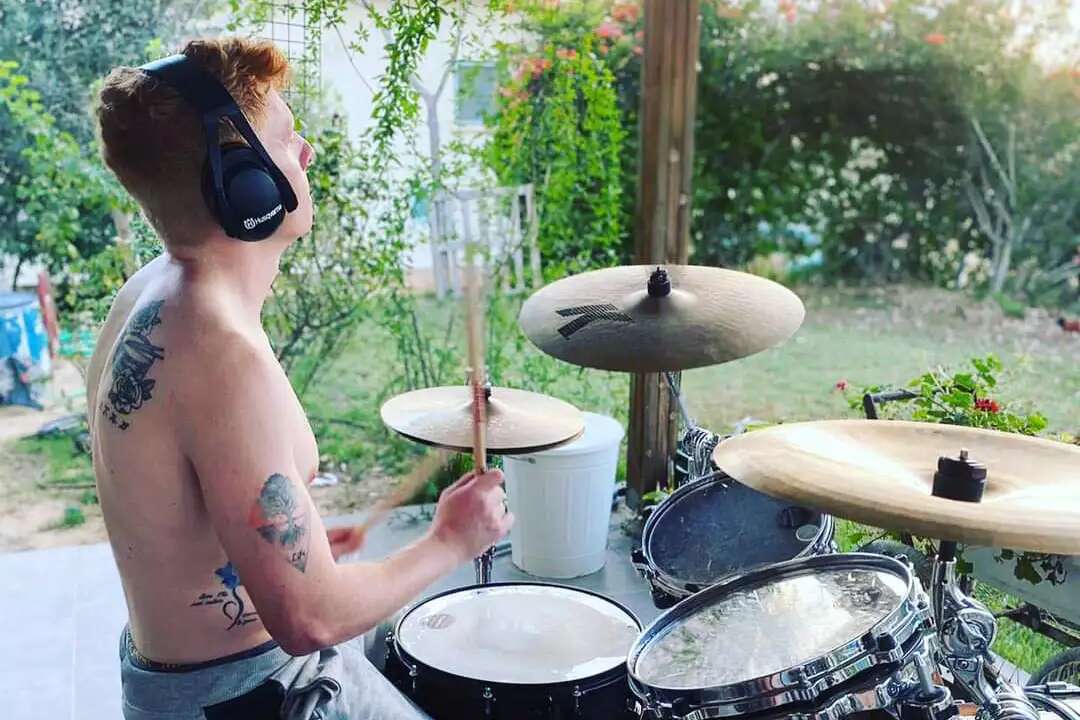Iris Haim touched the heart of the nation when she said she was not angry at the IDF "for even a minute" after soldiers accidentally killed her son, Yotam Haim, along with other two hostages they mistook for Hamas terrorists in the Gaza Strip. Yotam, a gifted drummer, was taken hostage on Oct. 7 and survived 70 days in captivity.
Follow Israel Hayom on Facebook, Twitter, and Instagram
Iris even sent a message to the fighters to boost their morale, saying, "I know that everything that happened is absolutely not your fault, and nobody's fault except that of Hamas. Don't think that you killed a hostage deliberately. You have to look after yourselves because that's the only way you can look after us."
Video: Soldier of brigade that accidentally killed Yotam Haim arrives at his shiva / Credit: Racheli Freifeld
I meet Iris in Sho'eva, near Jerusalem, where she and her husband are staying temporarily after being evacuated from the Gaza periphery. She makes us tea and takes a seat in her armchair, cuddling a furry plump cat.
"The cat came with the apartment, which used to be an art studio and became a residential apartment for us. Sho'eva residents rallied and collected furniture for us. Look how beautiful it is. We left eight cats in Sde Nitzan. Raviv, my husband, who works as a farmer, started going back there, and now he will take care of them."
Iris both radiates strength and calm and sets boundaries. She says she will not return to the Gaza periphery.
"I can't live there under threat. The rocket sirens take me back to that day. I don't want to see Gaza either. As far as I'm concerned, may that cursed place be erased from the face of the earth. But I know that it won't happen and that the threat will remain. I believe that the scene will change a lot. Half of the people who lived there will not return, but new people will come, who, due to Zionism, will agree to live in a very dangerous place."
Before Oct. 7, the Haim family lived with a complete sense of security, and Yotam was not afraid either. They were not affected by the frequent missiles and did not run away during IDF operations either. But perhaps the difficulty for Iris to return now stems from a different reason.
"I can't sit again on the same balcony where Yotam sat, with the rolling laughter, the cigarette in his mouth, and the cats around him. We laughed a lot together. The children would imitate me and we would burst out laughing. And Yotam was in the lead.

Iris cannot imagine staying in Sho'eva either. Not between the four walls that saw her anxious to receive word of Yotam and her breakdown when the tragic news arrived.
"Here, on this couch, I broke down and screamed. These were cries of terrible pain. That Friday, when we received the news, I was in terrible despair. I didn't know how I would manage to get out of this, how to live, how to raise my head.
"There was another breaking moment when we watched the local media do a piece on Yotam. Seeing his childhood photos again broke my heart. I want to turn a new page. We found an apartment in Even Sapir, and Raviv will divide our time between the Jerusalem mountains and the Gaza periphery. Yotam is everywhere and will always be in my heart."
"Nationwide couples therapy"
Since Oct. 7, Iris rarely watches TV or listens to the radio. In the morning before we met, she turned on the IDF radio for five minutes and said was horrified.
"They had some council head from the north. He started shouting: 'What is this? What country do I have? I don't want to be a citizen of this country. I am ashamed.' While in fact, it's amazing what's happening in the country, the whole nation is mobilizing for the soldiers and for the hostages. Why isn't that talked about enough?"
Q: How does one exit this circle of sadness? It seems that as a nation we are moving back to Oct. 6, with the division and infighting.
"We won't go back to Oct. 6, because we went through amazing things together. We proved to ourselves that we love each other, and we have to remember that all the time, even when we fight. It's like couples therapy, you have to learn how to fight without destroying each other. We need nationwide couples therapy to know how to fight and argue.
"I lost my son, but I gained my people. I learned who the people of Israel are, and I want to remain constantly in this consciousness that I have the best people. I have no other country. There are and will be fights, but we should not sink into it. We will overcome them and take care of our home, together. How do we do it? I don't know. But we shouldn't give up. Maybe everyone should inspect themselves as to what they bring to the front. There are beautiful articles out there, but the commentators cloud the atmosphere. The public has a choice about what to consume.
"I am interviewed by all the media and I stay with the non-political messages. When the judicial reform was discussed, I thought that my eldest son, Tuval, who is gay, would not be able to go out with his partner, and that they would be put in jail. I thought that I myself would have to wear a wig. I almost joined the protests dressed as a handmaid. It's amazing how much the incitement in the media has dumbed us down and destroyed us. Today I understand that people who feed on one-dimensional media allow someone else to control their mind and disrupt their independent thinking. I no longer watch television."
When driving, instead of listening to the radio, Iris listens to podcasts and audiobooks. Recently, she has been listening to one in particular – "The Gift: 14 Lessons to Save Your Life" by Edith Eger, a Hungarian-born American psychologist, a Holocaust survivor, and a specialist in the treatment of post-traumatic stress disorder.

Iris first read a book by Eger, "The Choice: A True Story of Hope," a year and a half ago.
"I really connected with Eger's concept. A person can choose at any given moment whether he or she is in the ditch or in the light. 'The Gift,' which I am listening to now, is a book with practical tools to deal with difficulties in life. It helps me and brings me to amazing places."
The secret of Iris' self-control begins precisely with the insight that we have no control over life.
"At any given moment, a meteor can fall on us or a tsunami can occur. Then who will we blame? We will surely blame someone who did not foresee the tsunami in time. If I have a stroke or a heart attack, who will I blame? For those who live in a false sense of control, everything has been shaken on Oct. 7, but I realized even before that our only control is to choose how to think."
Q: How did you come to this realization?
"I am a palliative nurse, I take care of people at the end of life – at the moment when it is most out of our control. My specialty is accompanying dementia patients, a disease without hope, which has no cure and no control over it. The person fades in front of your eyes, talks nonsense, and thinks that his daughter is his mother. There is a lot of frustration and helplessness in this disease, which also lasts a long time.
"I founded an organization called Refuat Haim that provides comprehensive support for caregivers of dementia patients. I teach them to be well in the midst of uncertainty. How? With the help of the insight that there is no control, that we have no ability to influence the disease itself, but we can influence the patient if we ourselves are at ease in the situation."
During the 70 days that Yotam was in captivity, Iris knew how to recognize that she was in the same loop of uncertainty that characterizes the families held "captive" by the delusions of the dementia patient's memory. "I knew that even if I shouted, screamed, prostrated myself, pulled out my hair in the square, and cursed Netanyahu, that would not bring me my child."
Iris explains that what allowed her to stay centered in the midst of uncertainty is the practice of conscious presence that aims to control thoughts that scatter and to be present in the "here and now."
Iris immediately gives an example using her cat.
"I stroke the cat and focus on the touch. Every time my thoughts become scattered, I return to the present with the help of the stroking and the feeling of the fur. It is a basic practice that changes lives. There were times when I was very angry, I would get angry in the face of injustice. Anger is another emotion in the basket of emotions. We learn to use it already as children, and with its help activate our environment and receive attention. As adults, anger no longer serves us, but we automatically continue to use it. With the help of mindfulness, I got rid of anger. I can feel hurt, sad, and disappointed, but not angry because anger connects us to something difficult that someone else did to us, and leaves us in the consciousness of the victim. It is simply unnecessary."
Without background noise
During the uncertainty of the days of Yotam's captivity, Iris chose to create certainty for herself through the belief that Yotam was alright, with the understanding that thought creates reality. When Tuval, her eldest son, also a musician, said, "Poor Yotam," Iris asked him, "How do you know that he is poor?" Tuval admitted that he did not know. "So don't think that he is poor. Think that he is alright. You have the choice to think as you please."
Iris exercised that right to the end. She imagined her son drumming on his body and also believed that he received the medication he needed.
"Yotm was born with an intestinal malformation, and suffered from chronic inflammation of the spine. He received a very expensive biological drug. It was clear to me that he would not get the injection he needed in captivity, but I believed he did receive something that would ease his pain. That worked for me. I realized that I could only rule this little space of mine," Iris says, putting one hand on her heart and the other on her head.
After 53 days, Iris received word of Yotam from a Thai hostage who was released, who told her that Yotam did indeed drum on the floor and that he even received painkillers to help with the pain.
Besides choosing what to think, Iris also chose what not to do.
"I used to be a person who consumed a lot of television, but the television was turned off at the request of Tuval, whose house we stayed at in the first few days. Tuval told me: 'Mom, I'm scared, I can't watch TV anymore.'
"So we turned it off, and just put on soothing elevator music. I also chose not to listen to rumors, and rely only on reliable information. As soon as we were appointed a contact woman from the IDF, with whom we immediately connected, I was more relaxed. I knew there was only one phone number, and I know if it rings then there is new information. I didn't have to be alarmed by every ringing."

Iris decided that she trusts the IDF and the government, even though she did not choose it, as one whose worldview aligns more with the Center-Left. "This is the current government, and until the next elections, I trust it. I only have one country, and it cannot be that there are two countries here, the State of Israel and the Hostage and Missing Families Forum. I didn't think it was right to shout that nothing is being done, while soldiers are fighting in Gaza and being killed to free hostages. I stuck to Byron Katie's method of fact and asked if what I was hearing were facts or interpretations.
"For example, when we went to the Cabinet, they talked about hostages who had been released, saying 'the shelling killed us.' So I asked myself, what do they mean? There they were, alive. So they were not killed. This is not the truth, this is interpretation. Perhaps my son's truth is different. Maybe the shelling actually made Yotam happy? I feel that this is how I was able to escape from the very, very difficult and frightening messages that the Hostage and Missing Families Forum sent to the families.
"I didn't connect to these messages and decided that I would create my own messages. I said I trust my son to survive. The more I talked about Yotam's strengths, the stronger I became, and I realized that I was conveying messages that strengthen other people."
Only Hamas is to blame
About two months before being taken captive, Yotam, who struggled with physical and mental difficulties, asked his parents to appreciate him more and to look at his strong sides – as if subconsciously preparing his parents for what would soon occur.
"I want you to see me as strong, not to perceive me as disabled," he said, complaining that they valued Tuval and Noya, his younger sister, a multidisciplinary artist, more.
Subscribe to Israel Hayom's daily newsletter and never miss our top stories!
"It was his inner feeling," Iris explained. "At first I wanted to say to him: 'What do you mean? We value you all the same,' and then I said: 'You know what? I agree with you. There is something in the fact that we see you as someone who needs us more, who needs us all the time.'
"We agreed that he would start to show his strong sides and I decided that whenever Yotam showed a red flag I would not immediately jump in to help and take over."
Q: What do you mean by "red flag"? Did Yotam have suicidal thoughts?
"Never anything in action, but there was a lot of talk about it. And it's amazing how this young man, who talked about death, in the end, survived in captivity and did everything possible to live. He truly showed his strength in captivity. I'm afraid to see his last video published by Hamas. When I saw a picture from the video, I said he looked like a Holocaust survivor, so thin. I realized that's enough for me right now. But I know he sent us messages. I was told he said there: 'Mom, don't worry about me, I'm strong.' It's crazy.
"He did an amazing job there and discovered his strengths. He could have been slaughtered on Oct. 7, but his soul chose to remain in the world for another 70 days and allow him to die as a hero and as a free man, so that everyone will know him and so that we can, in his name and memory, help people and have a positive influence."




